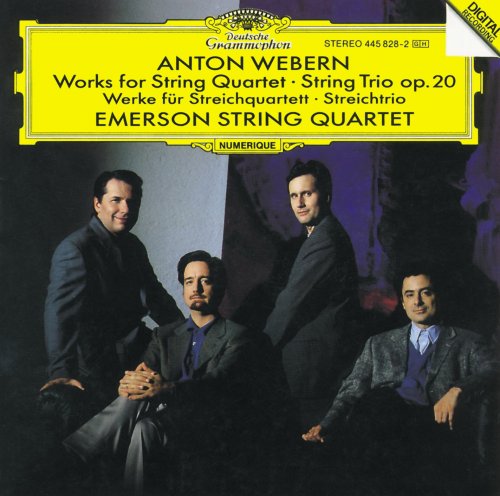
Emerson String Quartet - Webern: Works for String Quartet, String Trio Op. 20 (1995)
BAND/ARTIST: Emerson String Quartet
- Title: Webern: Works for String Quartet, String Trio Op. 20
- Year Of Release: 1995
- Label: Deutsche Grammophon
- Genre: Classical
- Quality: FLAC (tracks)
- Total Time: 01:06:52
- Total Size: 273 Mb
- WebSite: Album Preview
Tracklist:
Slow Movement for String Quartet 1905 (Anton Webern)
1. Webern: Slow Movement For String Quartet (1905) 08:57
5 Movements for String Quartet, Op.5 (Anton Webern)
2. 1. Heftig bewegt 02:21
3. 2. Sehr langsam 02:29
4. 3. Sehr bewegt 00:41
5. 4. Sehr langsam 01:49
6. 5. In zarter Bewegung 03:32
String Quartet (1905) (Anton Webern)
7. Webern: String Quartet (1905) 15:21
6. Bagatelles For String Quartet, Op.9 (Anton Webern)
8. . Mässig 00:34
9. 2. Leicht bewegt 00:27
10. 3 . Ziemlich fliessend 00:21
11. 4. Sehr langsam 00:50
12. 5. Äusserst langsam 01:14
13. 6. Fliessend 00:31
14. Webern: Rondo For String Quartet (1906) 06:43
Movement for String Trio op.post. (Anton Webern)
15. Webern: Movement For String Trio Op. Post. 02:02
Three Pieces for String Quartet (1913) (Anton Webern)
16. 1. Bewegt 00:35
17. 2. Langsam "Schmerz immer Blick nach oben" 01:25
18. 3. Nicht zu langsam 00:30
String Trio op.20 (Anton Webern)
19. 1. Sehr langsam 03:26
20. 2. Sehr getragen und ausdrucksvoll 05:21
String Quartet, Op.28 (Anton Webern)
21. 1. Mässig 03:49
22. 2. Gemächlich 01:44
23. 3. Sehr fliessend 02:10
Performers:
Emerson String Quartet
Slow Movement for String Quartet 1905 (Anton Webern)
1. Webern: Slow Movement For String Quartet (1905) 08:57
5 Movements for String Quartet, Op.5 (Anton Webern)
2. 1. Heftig bewegt 02:21
3. 2. Sehr langsam 02:29
4. 3. Sehr bewegt 00:41
5. 4. Sehr langsam 01:49
6. 5. In zarter Bewegung 03:32
String Quartet (1905) (Anton Webern)
7. Webern: String Quartet (1905) 15:21
6. Bagatelles For String Quartet, Op.9 (Anton Webern)
8. . Mässig 00:34
9. 2. Leicht bewegt 00:27
10. 3 . Ziemlich fliessend 00:21
11. 4. Sehr langsam 00:50
12. 5. Äusserst langsam 01:14
13. 6. Fliessend 00:31
14. Webern: Rondo For String Quartet (1906) 06:43
Movement for String Trio op.post. (Anton Webern)
15. Webern: Movement For String Trio Op. Post. 02:02
Three Pieces for String Quartet (1913) (Anton Webern)
16. 1. Bewegt 00:35
17. 2. Langsam "Schmerz immer Blick nach oben" 01:25
18. 3. Nicht zu langsam 00:30
String Trio op.20 (Anton Webern)
19. 1. Sehr langsam 03:26
20. 2. Sehr getragen und ausdrucksvoll 05:21
String Quartet, Op.28 (Anton Webern)
21. 1. Mässig 03:49
22. 2. Gemächlich 01:44
23. 3. Sehr fliessend 02:10
Performers:
Emerson String Quartet
Opening with the longest single movement Anton Webern ever composed, this collection of his nine works for string quartet and trio covers his entire career. For starters, it bears reminding that the first, longest movement he wrote encompasses a mere nine minutes--glorious minutes, but only nine of them. They make up the 1905 string quartet, taken abundantly through its most sonorous dialogues by the Emerson String Quartet, who provide a lavish setting in Lawrence Dutton's viola for the crucial middle ground between David Finckel's robust cello and the sometimes jarred, sometimes whizzing violins of Eugene Drucker and Philip Setzer. Beyond the first string quartet, there are loads of vantages here from which to examine postserial music. For while Webern owed much to Schoenberg's revolution, he owed even more to an inherently economic sense of wholeness. These are miniatures, really, each cutting rapidly to the quick of the matter and finding sometimes abrupt completion. It's perfect music for an era when the tension between experimentation and economy of phrasing urges on creative motion. And here it's perfectly played: tense, sad, sweet, and urgent. -- Andrew Bartlett
DOWNLOAD FROM ISRA.CLOUD
Emerson String Quartet Webern Works for String Quartet String Trio 95 2705.rar - 273.1 MB
Emerson String Quartet Webern Works for String Quartet String Trio 95 2705.rar - 273.1 MB
As a ISRA.CLOUD's PREMIUM member you will have the following benefits:
- Unlimited high speed downloads
- Download directly without waiting time
- Unlimited parallel downloads
- Support for download accelerators
- No advertising
- Resume broken downloads


